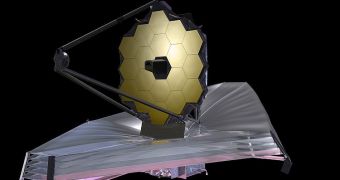The successor NASA plans for the Hubble Space Telescope will continue to receive funding throughout 2012, representatives from the American space agency announced recently. Still, this was not the only problem plaguing the project, and its fate has yet to be fully decided.
The James Webb Space Telescope (JWST) is one of the most ambitious projects NASA has ever contemplated. It will be the largest and most advanced spacecraft ever deployed to space, surpassing even the European Space Agency's (ESA) Herschel Space Observatory in terms of complexity.
But the project started years ago, and poor management decision have plagued it from the onset. Most notably, the entire spacecraft is now estimated to be worth about $8.8 billion by 2018, when it's due for launch. Understandably, the agency had to evaluate it very closely.
At the end of last year, the JWST was nearly canceled when Senate proposed a bill that would have essentially cut funding for what politicians perceived to be a money hole. Still, the project endured, and it was now announced that it would continue to receive funding, at least for 2012.
The main issue with this telescope – and the main reason why it costs so much – is that it incorporates a very large number of technologies that were non-existent when the first cost analyses were conducted.
All these technologies had to be developed as the project was ongoing, and naturally some of them took longer than expected to research. This led to delays and cost overruns that eventually pushed the JWST to its current price tag.
But officials in Washington eventually decided to continue funding it for the 2012 fiscal year, so NASA is now authorized to allot about $529.6 million (€414 million) for the telescope. The space agency's entire budget for this fiscal year amounts to $17.8 billion (€13,92 billion).
“The re-plan effort to put JWST on a more sound schedule and budgetary basis began in earnest last year in the winter. What was being done to change the program – to give people confidence that this time we got it right – it all culminated when NASA got its budget passed,” said Eric Smith.
The expert made the announcement at the 219th meeting of the American Astronomical Society (AAS2012), which was held on January 9 in Austin, Texas. “The budget that we received in 2012 was the budget that was needed for the re-plan,” he told attendants.
Smith is the JWST deputy program director at NASA Headquarters, in Washington, DC, Space reports. He explained that the money was meant to be used for the construction of the observatory's main scientific instruments.

 14 DAY TRIAL //
14 DAY TRIAL //